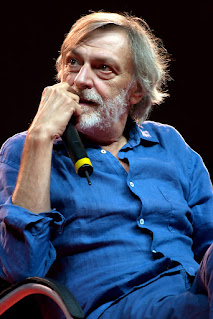‘Maestro of humanity’ built hospitals for war victims
.jpeg) |
| Gino Strada's charity has helped more than 11 million people worldwide |
Emergency has provided free healthcare to more than 11 million people in 19 different countries, including locations severely affected by conflict such as Afghanistan, Iraq, and Yemen. It also operates in Eritrea, Sierra Leone, Uganda, Sudan, Cambodia, Serbia, Nicaragua and Sri Lanka.
The hospitals set up by the organisation - some designed with the help of Strada’s friend, the world-renowned architect Renzo Piano - are built to the highest standards, with the aim of providing world-class treatments and after-care. Strada, who was said himself to have performed more than 30,000 operations on direct or indirect victims of conflict, insisted that the hospitals in which his European volunteers worked had to be places where “you would be happy to have one of your family members treated”,
When Strada died in 2021, among the many tributes paid to him was one by the then president of the European parliament, David Sassoli, who described him as the ‘maestro of humanity’.
The son of a steelworker, Strada attended the Liceo Classico Giosuè Carducci, a high school specialising in science near Milano Centrale railway station. He then studied medicine and trauma surgery at the University of Milan, where he graduated in 1978, before training as a heart-lung transplant surgeon in the United States and South Africa.
.jpg) |
| The Emergency organisation's logo has become a familiar sight in 19 countries since 1994 |
In 1988, he began to work as a surgeon with the International Committee of the Red Cross in various conflict zones, including Pakistan, Ethiopia, Peru, Afghanistan, Thailand, Djibouti, Somalia and Bosnia.
He founded Emergency in 1994, along with his then-wife, Teresa, and with the support of colleagues. They provided their first medical services in Rwanda in the wake of the genocide there, when an 800,000 people were killed by Hutu extremists.
Funded mainly through private donations, Emergency has cared for the civilian victims of land mines, improvised explosive devices, bombings, suicide attacks and of the diseases that flourish in communities without access to proper sanitation and medical services as a result of conflict.
 |
| Strada worked in Italy at the height of the Covid-19 pandemic |
Emergency also set up a hospital in Afghanistan's Panjshir Valley, followed by others in Kabul and Lashkar Gah. Rigorously neutral in all conflicts, Strada spent several periods living in Afghanistan, where he once negotiated with Taliban leader Mohammed Omar and the leaders of rival Northern Alliance to ensure the safety of Emergency patients on both sides of the conflict.
Strada preferred Emergency to remain non-political, but he found it impossible at times to be neutral. He opposed Italy’s involvement in Kosovo in 1999 and was an outspoken critic of the US-led invasion of Iraq in 2003. When Italy banned the manufacture, sale and export of anti-personnel landmines in 1997, it was in part due to a lobbying campaign by Emergency.
After decades taking on medical challenges in remote corners of the world, Strada found that the coronavirus pandemic created a demand for Emergency’s services in his native Italy, the first western country to be ravaged by the disease in 2020. The organisation provided medical care in the hardest-hit cities, as well as helping with delivering medicine and provisions for vulnerable people during lockdowns and handing out free food other essentials for Italians impacted by the economic consequences of the pandemic.
Widowed in 2009 when his wife, Teresa, died, Strada remarried in June 2021 to Simonetta Gola, Emergency's communications manager, but less than two months after the wedding he fell victim to a heart attack while on holiday in France and sadly passed away at the age of 73.
Although he had a history of heart trouble, his death came as a shock to many as he had shown no sign of slowing down. His daughter by his first marriage, Cecilia, is a former president of Emergency. The current president is Rossella Miccio.
 |
| The suburb of Sesto San Giovanni in Milan has transitioned from industrial to business centre |
Sesto San Giovanni, where Gino Strada was born, is the northernmost point on the Milan M1 metro line. In the 1920s it had a population of just over 15,000 but began to expand as an industrial centre, becoming the base for several large companies in the steel and motor industries but also the Campari drinks company. The years after the Second World War saw a huge influx of migrants from other parts of Italy, attracted by the job possibilities. Today, the area is a busy suburb with more than 85,000 inhabitants. The current employers are more in the service sector, such as the telecommunications company, WIND.
 |
| The facade of Milano Centrale railway station was designed by Ulisse Stacchini in 1931 |
Milano Centrale station, close to where Gino Strada went to high school, is one of Italy’s busiest rail hubs. It has 24 platforms and handles about 320,000 passengers per day, using approximately 500 trains. The station is an important stop on the north-south route between Bologna and Salerno and also has trains running daily to international destinations including Bern, Lugano, Geneva, Zürich, Paris, Vienna, Barcelona and Munich. It was designed by the architect Ulisse Stacchini, a champion of Liberty style Art Nouveau designs, who also designed the stadium that evolved into the city's iconic Stadio Giuseppe Meazza, joint home of Milan's two major football clubs, Internazionale and AC Milan.
Also on this day:
753 BC: The founding of the city of Rome
1574: The death of Tuscan leader Cosimo I de' Medici
1922: The death of castrato singer Alessandro Moreschi
1930: The birth of actress Silvana Mangano
No comments:
Post a Comment